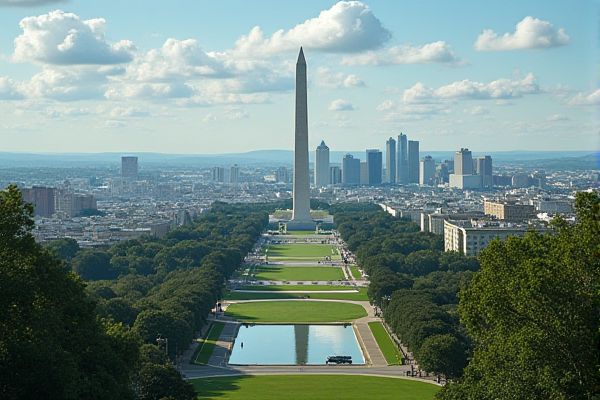
Insights from Washington residents and expatriate communities: Weather: Rainy winters, mild summers. Transport: Efficient public transit systems. Culture: Diverse arts and music scene. Housing: Competitive real estate market. Education: Quality schools and universities. Employment: Tech industry hub. Food: Diverse culinary options. Nature: Abundant outdoor activities. Community: Active social organizations. Safety: Generally safe neighborhoods.
Weather: Rainy winters, mild summers.
Washington residents and expatriate communities enjoy a climate characterized by mild summers, where temperatures rarely exceed 79°F (26°C), and rainy winters, with significant rainfall, particularly in Western Washington. The Seattle area, known for its lush greenery and vibrant culture, receives about 37 inches (94 cm) of annual rainfall. To learn more about the unique Climate and Geography of Washington, check out this informative resource that provides further insights into the region's diverse weather patterns and geographical features.
Transport: Efficient public transit systems.
Washington, DC residents and expatriate communities rely heavily on the efficient public transit system managed by the Washington Metropolitan Area Transit Authority (WMATA), which includes Metrorail, Metrobus, and MetroAccess. These services provide comprehensive coverage across DC, Virginia, and Maryland with frequent services and multiple route options. For more detailed information, you can visit the comprehensive Metro System page.
Culture: Diverse arts and music scene.
Washington, D.C. boasts a diverse and vibrant arts and music scene, characterized by a thriving underground community of musicians exploring avant-garde forms of electronic music, jazz, rap, and punk, with a strong spirit of collaboration and community interaction, particularly centered around spaces like Rhizome.
Housing: Competitive real estate market.
The Washington State housing market in 2024 is characterized as a transitional market, with median home prices rising at a slower pace, reaching $695,100 in Q2 2024. While some areas like Western Washington remain competitive and expensive, Eastern Washington offers more affordable options. The Washington State Housing Market is showing signs of cooling, giving buyers slightly more leverage.
Education: Quality schools and universities.
Washington State is renowned for its high-quality educational institutions, including top-ranked public universities like Washington State University and the University of Washington, as well as esteemed private colleges such as Pacific Lutheran University and Seattle University. These institutions offer a diverse range of programs and innovative research opportunities, along with a commitment to academic excellence and student success. For more details on these outstanding colleges, visit Bold.org.
Employment: Tech industry hub.
Washington State has emerged as a significant hub for the tech industry, with tech sector employment growing by nearly 34% over the last decade. This growth accounts for 11.2% of the overall workforce and contributes over 20% to the state's economy, marking it as the highest percentage in the U.S. The state leads the nation in the net percentage of new tech positions and boasts a high concentration of tech-related jobs, including software, cybersecurity, and data science roles. For more on Washington's growing dominance in the tech landscape, visit Washington's Innovation Economy.
Food: Diverse culinary options.
Washington, D.C. offers a diverse culinary scene with top-notch restaurants representing various global cuisines, such as Compass Rose for multicultural brunch, Pho Viet for Vietnamese pho, and Indigo for Indian cuisine, reflecting the city's vibrant and inclusive food culture. The city's culinary landscape is characterized by farm-to-table practices, international fusion dishes, ethical dining, and innovative street food, making it a food lover's paradise with a wide range of flavors and culinary experiences. For a deeper exploration of the culinary offerings in the nation's capital, be sure to check out the Diverse Food Scene Of Washington DC for more insights into the city's gastronomic delights.
Nature: Abundant outdoor activities.
Washington residents and expatriate communities can enjoy a vast array of outdoor activities, including hiking, camping, boating, fishing, and exploring the state's three national parks and 124 state parks, as well as numerous natural and wildlife areas. The Tri-Cities area offers extensive outdoor recreation opportunities, including biking, hiking, golfing, and wildlife viewing, with its arid region boasting minimal rainfall and plenty of sunshine, making it ideal for various outdoor adventures. For those seeking more adrenaline-pumping experiences, Washington State provides a diverse range of outdoor adventures beyond hiking, such as mountaineering, ziplining, mountain biking, windsurfing, rock climbing, diving, kayaking, and surfing, catering to all skill levels and interests.
Community: Active social organizations.
The Washington Community Alliance is a statewide coalition of organizations led by and working in communities of color, focusing on relational organizing, leadership development, capacity building, policy advocacy, and increasing political representation for communities of color in Washington State.
Safety: Generally safe neighborhoods.
Washington residents and expatriate communities often highlight cities like Camas, Sammamish, Oak Harbor, and Kenmore as exceptionally safe, with low violent and property crime rates, and strong community and public safety policies that contribute to their safe environments. These cities are known for their low crime rates, robust law enforcement, and community-centered safety initiatives. For those exploring the safest cities to live in Washington, the detailed insights on cities such as these are outlined on the Reolink blog, making them highly desirable for those seeking safe neighborhoods.
